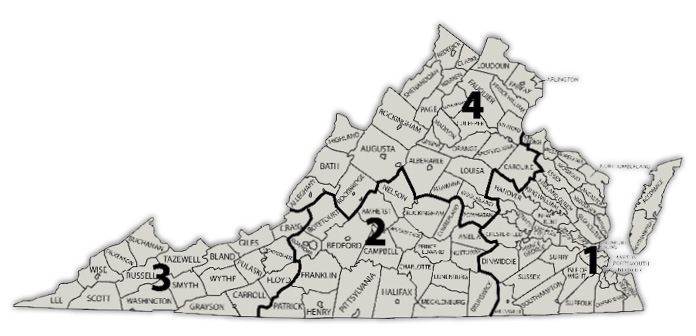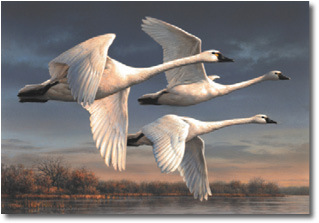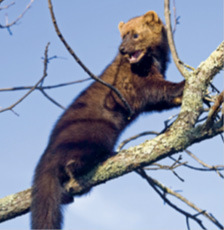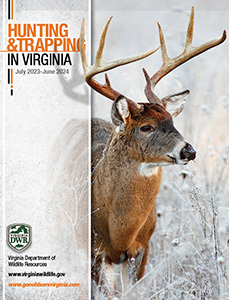Virginia DGIF & Contacts
Commonwealth of Virginia
Glenn Youngkin, Governor
Secretary of Natural and Historic Resources
Travis A. Voyles
Department of Wildlife Resources
Ryan J. Brown, Executive Director
Members of the Board
Tom Sadler, Chair, Verona
Jon Cooper, Vice-Chair, Botetourt
Leon Boyd, Vansant
Catherine H. Claiborne, Richmond
John W. Daniel II, Richmond
Michael Formica, McLean
Tammy Jo Franklin, Big Stone Gap
Mamie A. Parker, Ph.D., Dulles
George J. Terwilliger, Delaplane
Brian Vincent, Farmville
G.K. Washington, Dillwyn
Mission Statement
Conserve and manage wildlife populations and habitat for the benefit of present and future generations. Connect people to Virginia’s outdoors through boating, education, fishing, hunting, trapping, wildlife viewing and other wildlife-related activities. Protect people and property by promoting safe outdoor experiences and managing human-wildlife conflicts.
The Department of Wildlife Resources shall afford to all persons an equal access to Department programs and facilities without regard to race, color, religion, disability, national origin, sexual orientation, gender identity, age, political affiliation, or veteran’s status. If you believe that you have been discriminated against in any program, activity, or facility, please write to: Virginia Department of Wildlife Resources, Attn: Executive Director’s Office, 7870 Villa Park Dr, Suite 400, P.O. Box 90778, Henrico, VA 23228.
Headquarters
7870 Villa Park Drive, Suite 400
Henrico, VA 23228
(804) 367-1000; (804) 367-1278 V/TDD
Mailing Address:
P.O. Box 90778
Henrico, VA 23228-0778
Boating Registration/
License Fees
(804) 367-1000
Note: The Headquarters Office is the only Department location where visitors may title/register a boat. These services are not available at the Regional Offices.

Additional Contacts
Report Wildlife Violations Only
(800) 237-5712
Email: [email protected]
Text DWRTIP plus your tip to 847411
Boating Registration/License Fees
(804) 367-1000
Harvest Reporting
(866) GOT-GAME (866-468-4263)
Quota Hunts
<a href="http://www.gooutdoorsvirginia.com
" class="redactor-autoparser-object">www.gooutdoorsvirginia.comVirginia Department of Forestry
Headquarters: (434) 977-6555
State Forest: (804) 492-4121 https://dof.virginia.gov/education-and-recreation/state-forests/recreation-and-hunting/
Department of Conservation and Recreation Reservation Center
(800) 933-7275
USDA Wildlife Services
(804) 739-7739
U. S. Forest Service Supervisor George Washington and Jefferson National Forest
(540) 265-5100
U.S. Fish and Wildlife Service
(Federal wildlife inquiries only)
(804) 771-2883; (804) 771-2280
Regional Offices
Region 1
3801 John Tyler Memorial Hwy.
Charles City, VA 23030
(804) 829-6580
Region 2
1132 Thomas Jefferson Road
Forest, VA 24551-9223
(434) 525-7522
Region 3
1796 Highway Sixteen
Marion, VA 24354
(276) 783-4860
Region 4
P.O. Box 996, 517 Lee Highway
Verona, VA 24482
(540) 248-9360
1320 Belman Road
Fredericksburg, VA 22401
(540) 899-4169
Virginia’s Wildlife Restoration Program and You
Hunters and trappers create many opportunities for Virginians to enjoy exceptional hunting, trapping, and wildlife watching. Through the Federal Assistance in Wildlife & Sport Fish Restoration program, you help the Virginia Department of Wildlife Resources make wildlife-oriented outdoor recreation even better each time you buy a firearm, ammunition, or a hunting or trapping license.
When you buy hunting-related equipment, a portion of the excise tax levied on the manufacturer goes to the Federal Assistance in Wildlife Restoration program. Virginia currently receives approximately $20.4 million each year from this program, which funds a large portion of the Department’s habitat management and wildlife population research projects.
Q: Is it legal to kill snakes in Virginia?
A: No, under normal circumstances. Snakes can only be killed when their presence represents an immediate human health hazard or they are creating some other type of nuisance issue. State or federally protected species (e.g. canebrake rattlesnake) may never be killed under any circumstance. The indiscriminate killing of snakes is contrary to the Department’s conservation ethic.
Spotted Skunk Information Needed
Our Department would like to know if you have seen the animal in this photograph. The Eastern spotted skunk (Spilogale putorius), also known as a “civet cat,” is one of two species of skunks found in Virginia. Most people are familiar with the common striped skunk (Mephitis mephitis) that is statewide in distribution. The spotted skunk, however, is lesser known and generally found only in the western portion of the state. They are small, slender animals, usually not much larger than a squirrel (1 to 2½ pounds) and noticeably smaller than most striped skunks. The glossy black fur has four to six broken white stripes along the back and sides that resemble “spots.” The tail usually has a white tip and the head often has an inverted triangular white patch above the nose. The status of spotted skunks in Virginia is largely unknown, but populations are believed to have declined precipitously during the last half of the 20th century. Loss of suitable habitat has almost certainly contributed to this decline, but may not completely explain the spotted skunk’s decrease in numbers. Please note that it is illegal to shoot or trap spotted skunks (unless they are causing damage) and their pelts may not be sold. If you have information regarding occurrences of spotted skunks in Virginia, particularly trail camera photos or other verifiable evidence, please contact biologist manager Matthew Overstreet at (434) 525-7522 or by e-mail at [email protected].
Federal Electronic or “E-Stamp” Duck Stamp Program
A Federal Duck Stamp is required for all persons 16 years and older in order to hunt waterfowl. A convenient online option is available whereby hunters can obtain an E-stamp for $28.00. The E-stamp is valid immediately following the purchase and for up to 45 days. The physical Federal Duck Stamp will be mailed to the customer within 45 days and must be signed and carried thereafter while hunting waterfowl. Waterfowl hunters can still purchase their Federal Duck Stamp at some U.S. Post Offices at a cost of $25.00.
To obtain the Federal Migratory Duck E-Stamp go to the Department’s website (www.gooutdoorsvirginia.com) and click on hunting and fishing licenses or visit one of over 800 license agents throughout the Commonwealth.

Unlawful Feeding of Certain Wildlife
Not only is it illegal to hunt, chase with dogs, or attempt to kill game birds and animals from a baited site, it is also illegal to feed some wildlife under certain circumstances. The Department does not encourage the feeding of wildlife at any time of the year. Feeding restrictions help control the transmission of diseases, wildlife conflicts, littering concerns, and enforcement issues about hunting with bait.
- It is unlawful to place or direct the placement of, deposit, distribute, or scatter food or salt capable of attracting or being eaten by bear, deer, or turkey year round on National Forest and Department-owned lands.
- Cities and towns have the authority to prohibit the feeding of deer by local ordinance. Contact localities for details.
- Department regulation makes it illegal to place, distribute, or allow the placement of food, minerals, salt, carrion, trash, or similar substances to feed or attract the following:
- Deer and Elk:
- September 1 – first Saturday in January; statewide. Attractants must be removed by September 1.
- During any open deer or elk season; statewide
- Year round in Buchanan, Dickenson, and Wise counties as well as those counties listed on Deer Hunting CWD, which are associated with the management of CWD in Virginia (towns and cities within included).
- Bears: year round; statewide
- All species: Illegal to feed any wild animal when the feeding results in property damage, endangers people or wildlife, or creates a public health concern
- Deer and Elk:
Upon notification by Department personnel, if anyone continues with any of these activities for any purpose and it results in the presence of species mentioned previously in this box, such person shall be in violation of the law and subject to a fine of up to $500. No part of this regulation shall be construed to restrict bonafide agronomic plantings (including wildlife food plots) or distribution of food to livestock.
All Terrain Vehicle (ATV) Laws
No ATV shall be operated:
- On any public highway, or other public property, except as authorized by proper authorities or to the extent necessary to cross a public highway by the most direct route.
- By any person under the age of 16, except that children between the ages of 12 and 16 may operate ATVs powered by engines of no less than 70 cubic centimeters nor more than 90 cubic centimeters displacement.
- By any person unless he is wearing a protective helmet of a type approved by the Superintendent of State Police for use by motorcycle operators.
- On another person’s property without the written consent of the owner of the property or as explicitly authorized by law.
- With a passenger at any time, unless vehicle is designed and equipped to be operated with more than one rider.
The above does not apply to members of the household or employees of the owner or lessee of private property on which the ATV is operated.
Training Dogs on Military Bases
Fort A.P. Hill (name change pending), Fort Barfoot (formerly Fort Picket), and Marine Corps Base Quantico provide hunting dog training opportunities. See each installation’s iSportsman website below for details on access procedures and rules and regulations for hunting dog training on base.
Fort A.P. Hill: https://faph.isportsman.net
Fort Barfoot: https://ftpickett.isportsman.net/
Marine Corps Base Quantico: https://quantico.isportsman.ne...
Do You Have a Trail Camera Photo of This Animal?

If you have a trail camera photo of this animal, we would like to hear from you. The fisher (Pekania pennanti) once occurred in the western mountains of our state, but populations were likely extinct by the early 1900s. After a long absence, fishers appear to be reestablishing themselves as part of our fauna.
Fishers are members of the Mustelid or weasel family. They are stocky animals with an elongated body and relatively short legs. Adult fishers are about the size of a fox, typically weighing 4 to 12 pounds and measuring 30 to 47 inches from the nose to the tip of the tail. Their fur is dark brown and black. The face and shoulders often have a golden or silver sheen. The underside may have patches of white or cream-colored fur.
Please note that there is a continuous closed hunting and trapping season for fishers in Virginia. If you have verifiable information (i.e. trail camera photos, video, etc.) regarding occurrences of fishers in Virginia, please contact Matthew Overstreet at (434) 525-7522 or by e-mail at [email protected].
Feral Hogs
Feral hogs (wild hogs, wild pigs, wild boar, or Russian boar) are designated as a nuisance species in Virginia and are defined as “any hog that is wild or for which no proof of ownership can be made.” Feral hogs have been found to destroy turkey, grouse, and quail nests. They can also prey on deer fawns, destroy sensitive wetland habitat, contaminate waterways, and compete with our native wildlife for food resources. Feral hogs carry numerous diseases that can affect wildlife, domestic animals, and humans.
If feral hogs or hog damage are observed, or if feral hogs are harvested or trapped on private or public property, we ask you to make a report by calling our toll-free Virginia Wildlife Conflict Helpline (1-855-571-9003). It is illegal to transport live feral hogs or to release feral hogs to the wild in Virginia. Any feral hog trapped must be immediately killed at the trap site.
Virginia Wildlife Crime Line
Since its inception in October 1986, the Virginia Wildlife Crime Line has become a valuable tool in the enforcement of the Commonwealth’s game, fish, and boat laws. As awareness of this program increases, so do the number of calls to report violations. The program has generated thousands of reported wildlife crime tips that have resulted in over a thousand arrests and over $80,000 in approved rewards. Reward payments are approved and funded through the Virginia Sportsman Reward Fund, Inc. Their mission is to promote the enforcement of hunting, fishing, and boating laws in Virginia by supporting the Wildlife Crime Line in cooperation with the Virginia Department of Wildlife Resources. You can help support this effort by sending a tax-deductible donation to: Virginia Wildlife Crime Line, P.O. Box 90778, Henrico, VA 23228-0778.
Report a Wildlife Crime
If you know someone who kills wildlife out of season or over the game limit, help the Virginia Department of Wildlife Resources. catch the individual and stop others from following that path. If you observe a violation, call the toll-free Virginia Wildlife Crime Line number at (800) 237-5712, e-mail [email protected], or text DWRTIP plus your tip to 847411.
Tree Stand Safety Guidelines
- Use a full-body safety harness to secure yourself to the tree. Stay attached whenever you are off the ground. Minimize slack in the tether so that if you fall, it will not be very far. This reduces the risk of injury and may allow you to climb back into your stand. Hanging in a harness for a long time may cause irreversible injury or death. Have a plan for self-rescue.
- Never climb with equipment; use a haul line to get your unloaded gun or bow into and out of the tree stand. Crossbows may be raised while cocked, but should never be loaded with an arrow until you are securely in the stand and ready to hunt. It can be dangerous to try to cock a crossbow while in a tree.
- Keep manufactured tree stands in good working condition. Always follow the manufacturer’s instructions carefully.
- Many falls occur because of the failure of homemade stands, especially as they age. It is best to avoid them.
- While most manufactured tree stands are safe if used properly, they are occasionally found to be defective and recalled. To find out if your stand has been recalled, check the Consumer Product Safety Commission website at www.CPSC.gov.
Additional Information on safety harnesses:
www.virginiawildlife.gov/hunting/education/treestand-safety
Bowhunters Needed for Survey
The Department has an ongoing statewide bowhunter survey to obtain information on bear, deer, turkey, small game, and furbearer populations. Participants will receive an annual survey form to complete during the early archery deer season and a copy of the results after they are compiled. To participate, please send your name and mailing address to [email protected] with “Bowhunter Survey” in the subject line.
Hunters for the Hungry
Our hope is that you will consider helping the Hunters for the Hungry program. We would ask you as a hunter, if you are able, to consider donating to help us feed those who struggle with hunger. There are two ways to donate:
First you can donate a deer, or multiple deer. If you are blessed in your hunting efforts, your deer can be donated to us through participating processors and/or collection sites all across Virginia. These donated deer are professionally processed and the venison distributed to local feeding programs statewide at no cost, helping men, women, and children who struggle with hunger.
Second, if you are able, please contribute financially to help us pay the processing costs for the donated deer. Financial gifts are a blessing to our feeding efforts. In 2003, legislation honoring our program’s founder David Horne was passed enabling hunters to voluntarily make a donation of any amount when they purchase their hunting licenses. You can also donate through our website.
No financial donations are required to donate deer to our program; however, for every $1.00 hunters contribute we are able to process and distribute 3.0 quarter-pound servings of venison to those in need as well as to promote our hunting heritage in a positive way.
Since 1991, our program, through the generous support of many hunters and non-hunters working together, has been able to process and distribute over 7.7 million pounds of venison to feeding programs throughout our state. This volume of meat equates to over 30.9 million quarter-pound servings!
For more information about our program, how you can get involved, or to donate please call 1-800-352-4868 or visit our website at www.h4hungry.org or you can write us at P.O. Box 304, Big Island, VA 24526
Please consider helping us in some way to help those who hunger.
• The program desires to expand its impact and ability to collect donated deer and desires to enroll additional processors. All interested processors are encouraged to contact the program.
CITES Tagging Requirement for Bobcats
Raw bobcat pelts and unskinned carcasses that are bought, sold, bartered, traded, solicited for purchase, or transported out of state must also have a CITES tag affixed to each pelt by the trapper or hunter who harvested the animal. A valid confirmation number will be needed to obtain a CITES tag. No CITES tag is needed to have a bobcat mounted by a Virginia taxidermist or to ship a bobcat pelt out-of-state for tanning purposes (unless required by the state where the tannery is located).
Before a sale, the trapper or hunter harvesting the animal needs to obtain a CITES tag. To obtain a CITES tag for a bobcat, contact Customer Service at (804) 367-1000 during regular business hours. If you cannot reach Customer Service, you can contact a Conservation Police Officer through your nearest Department regional office or your local Sheriff’s Office (after hours). Every effort will be made to provide CITES tags as quickly as possible, but we may not be able to accommodate short notice requests received on weekends or after hours. Nonresident hunters or trappers who need to leave the state before they are able to secure a CITES tag should plan to leave the bobcat pelt or carcass in the care of someone in Virginia until a tag can be attached.
Make sure that you have a valid harvest confirmation number for each CITES tag requested. Tags ordered from our Customer Service Center will be mailed directly to the hunter or trapper, along with instructions for tagging. If a bobcat pelt is required to have a CITES tag affixed, it must be tagged by April 1 of the season of harvest.
Q: Are bear attractant scents legal in Virginia?
A: Yes and no. They are illegal if they are used in a way that a bear can consume it. A good rule of thumb about these products is if a bear can only smell it, it is considered just a scent and is legal. If a bear can consume it or whatever it is applied to can be consumed, it is considered bait and is illegal.
Attention Rabbit Hunters
DWR is closely monitoring the status of a highly infectious virus of rabbits, known as rabbit hemorrhagic disease virus 2 (RHDV2). RHDV2 is not a human health concern. The virus causes significant mortality in wild and domestic rabbits and was detected for the first time in North American wild rabbits in the southwestern United States in 2020. While RHDV2 has not been detected in Virginia, spread across the U.S. is anticipated. RHDV2 outbreaks typically involve at least three dead rabbits of any age in a small, localized area, over a period of less than seven days. Most infected rabbits are in good body condition with no obvious wounds at the time of death. Bright red blood may be observed around the nose. Actions that can help minimize the introduction into or spread of RHDV2 within Virginia include:
- Reporting multiple dead rabbits fitting the description above to the nearest DWR regional office
- IMPORTANT! Per regulation, properly disposing of all portions of rabbits harvested in Virginia not saved for human consumption via burial (at least two feet), incineration, or double-bagging and placing in trash for transport to a landfill
- IMPORTANT! Per regulation, fully dressing (skin, feet, head, and internal organs removed) all rabbits harvested out-of-state before importing into Virginia (rabbits harvested on out-of-state properties that span the Commonwealth’s boundary will not be considered imported and should be handled as described for rabbits harvested in Virginia)
- Wearing gloves when dressing rabbits and avoiding contact with pet rabbits before showering and changing clothes after handling wild rabbits


